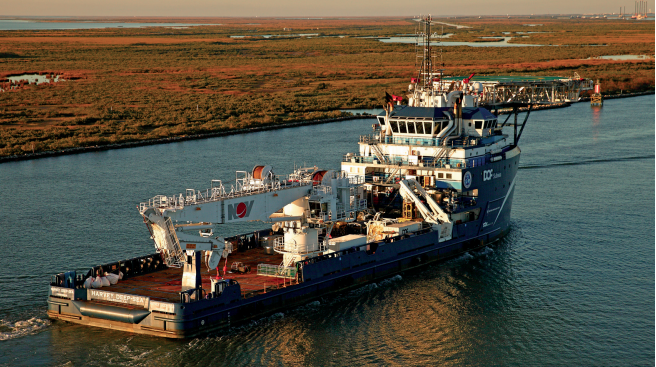Louisiana shed 21,500 maritime-related jobs from 2014 to 2016 as a result of the prolonged downturn in energy prices, and the battered industry could be dramatically affected by changes in state tax policy, according to a Louisiana State University study.
The study, conducted by professors Stephen Barnes and Dek Terrell from LSU’s Economics and Policy Research Group, was conducted with help from the Offshore Marine Service Association and the Louisiana Association of Waterway Operators and Shipyards.
The economists surveyed OMSA and LAWS members about their employee bases, expenditures, and capital investments, specifically from 2014 and 2016 – respectively the peak of the market, and two years into the worldwide oil price collapse. They received responses from 131 companies, mostly offshore supply and inland waterways operators.
Shipbuilding and repair took the biggest hit in those years, with employment dropping 40% from 9,150 to 5,470. Water transportation operators let go about 18% of their workforces, while 13% of the jobs in ports, cargo handling and other support activities dried up, the LSU team found.
The report, released as state lawmakers and Gov. John Bel Edwards wrestled with Louisiana’s budget shortfall, warned against making policy changes that could worsen the economic fallout from the oil patch depression.
“Because of the reduced profitability across this sector created by the recent slowdown, companies may be even more sensitive today to tax changes, which directly impact the bottom line,” the LSU authors wrote. “A large portion of the water transportation and support services sector is highly mobile; for example, a shipping company whose vessels travel thousands of miles a week can easily bring vessels to a shipyard in another state for repairs if costs in one area increase relative to a nearby alternative.
“Therefore, it is perhaps more critical now than ever that the debate surrounding adjustments in tax policy considers the long-run economic consequences of changes in state tax policy.”
In its current reduced state the maritime sector is still a powerhouse for the state economy, with OMSA and LAWS member companies providing 83,300 to 104,800 jobs in the state and $20.9 billion to $26.2 billion in overall economic impact, according to the report.
In a statement issued jointly with the industry associations, state lawmakers said they would bring the report findings to the economic policy debate.
“This study helps give us the information we need to tell the story of these industries,” said state Rep. Gene Reynolds, D-Minden.
The LSU economists noted that other Gulf Coast states hurting from the oil downturn could poach maritime businesses if Louisiana’s tax environment becomes less favorable.
“Since vessels are not fixed to the ground, it is relatively easy for a company to send a vessel to another Gulf Coast state or further up the Mississippi River for repair,” the authors wrote, citing as an example the 2011-2015 phase-out of the Avondale shipyard near New Orleans, as Huntington Ingalls consolidated shipbuilding operations in Pascagoula, Miss.
The Avondale closing cost some 5,000 jobs in Jefferson Parish, said state Rep. Julie Stokes, R-Kenner.
“It is incumbent upon us to protect the rest of the state, and the communities within it that rely upon the maritime industry, from similar economic distress. We must fully support this extraordinarily valuable industry,” said Stokes.
Louisiana needs to guard its offshore service industry too, the report stressed.
“While Port Fourchon currently serves as the primary base for offshore services in the Gulf of Mexico, other coastal ports from Texas to Alabama are strong contenders to attract offshore service companies,” the authors wrote. “While Louisiana wrestles with how to address structural shortfalls in the state budget, it is imperative that the long-term competitiveness of the state’s tax and policy environment be kept at the forefront of that debate.”





